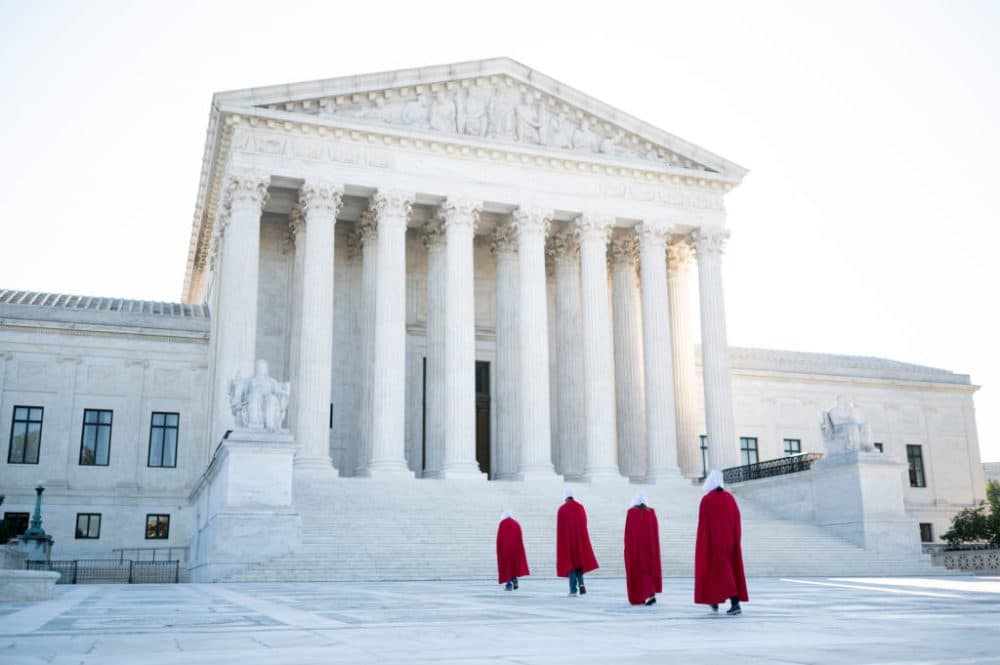Advertisement
Commentary
Mass. Should Become A Reproductive Health Care Sanctuary State

The ascension of Amy Coney Barrett to the U.S. Supreme Court is the last gasp of a GOP on the edge of electoral oblivion.
With the Trump campaign pulling its ads from states it won handily in 2016, the U.S. Senate looking likely to swap control to the Democrats and the public soundly behind Democratic policies, the GOP’s last arena to influence policy for the next two years appears to be the courts. Donald Trump and Mitch McConnell’s court-packing over the past four years was designed to take away women’s and other pregnant persons’ rights to access reproductive healthcare, by overturning Roe v. Wade.
And with Amy Coney Barrett they are probably going to do it.
Ten states already have “trigger laws” in place, which take effect in the event Roe is overturned. In states without these trigger laws, many male-dominated legislatures have passed draconian restrictions on women receiving abortions and medical professionals providing them.
In Texas, legislators held hearings to discuss whether the death penalty might be appropriate for a woman who received an abortion. An Ohio law would require doctors to attempt to re-implant even ectopic pregnancies, though that is medically impossible. Twelve states have “heartbeat bills” that ban abortion when there is a detectable heartbeat — long before most pregnant people know they are pregnant. While courts have blocked these “heartbeat bills" in 10 states, should Roe fall, they would also become law.
But the ROE Act isn’t enough. What do our rights mean if we do not extend them to every citizen of our nation?
And nine states still have pre-Roe abortion bans on the books, which would become enforceable if Roe is overturned. Each of these laws carries penalties for healthcare providers and/or women who make the choice to exercise control over their own reproduction.
In Massachusetts, we’re on the verge of moving in the opposite direction. The ROE Act, currently languishing in the state legislature, ensures Massachusetts residents continue to receive the protections of Roe v. Wade should that decision be overturned. If and when this state legislation is signed into law, it will be gratifying to reside in a state where women are valued, personal sovereignty reigns and people who get pregnant have the same rights to their own bodies that I enjoy. (After all, government does not get any bigger than when it is inside a uterus.)
But the ROE Act isn’t enough. What do our rights mean if we do not extend them to every citizen of our nation?
How can we — safe in our own freedoms — sleep well knowing that a pregnant person in Alabama or Georgia or Ohio could go to jail simply for making a decision about their own body? Or that doctors and other professionals who assist them could be tried for murder for doing the very same medical procedures available here in Massachusetts? The ROE Act is necessary, and we must do more.
It’s time for Massachusetts to become a reproductive health care sanctuary state.

This would be a relatively simple amendment to the existing Massachusetts General Laws. Currently, Article IV, Title II, Chapter 276, Section 13 allows the governor to authorize the rendition of a person wanted for a crime in another state to the authorities in that state. It’s a critical part of how criminal justice functions — it prevents violent criminals from committing a crime in one state and running to another to escape consequences. But it is not constitutionally mandated, nor does it require the governor to surrender someone on request.
“The Governor may surrender” these individuals is how the law is worded. Implied in the “may” is its opposite: “may choose not to” surrender. Amending this section of the Mass. General Laws to prohibit our governor from rendering certain people who seek sanctuary here is something we must do if our own rights are to have any meaning. Adopting this approach would put Massachusetts back at the leading edge of protecting personal freedoms, a place we have endeavored to occupy since the days of the American Revolution.
There are four specific categories of people we could protect — and live up to the ideals of reproductive choice to which we aspire. They include all people who are charged or under warrant for arrest: for trying to terminate their own pregnancy; for crimes related to terminating their own pregnancy; for assisting with or providing resources related to an abortion or a related crime; for assisting any of the previously mentioned individuals.
We have an opportunity in Massachusetts to not only guarantee reproductive freedom to our residents, but to anyone seeking care.
In short, we would extend the same safety and security the citizens of this state will continue to have, especially if and when the ROE Act becomes law, to anyone who finds themselves needing an abortion. It’s an affirmative statement that abortion is legal, rather than a set of circumstances in which it is legal.
As some Massachusetts cities and towns have become sanctuary cities for immigrants, we must create a safe place in Massachusetts for those who are being unjustly persecuted by state or federal governments gone rogue. As a national and world leader in individual liberty and human rights, it is our responsibility to protect people in our state wherever they are threatened, and anywhere injustice and inequality pursues them.
We cannot be both a leader in equality and progressive thought, and help those who would seek to deny those rights to people within our borders. We are better than that. We must be better than that.
The long and short of human rights — and the essential rights to personal autonomy all Americans are afforded today — is that all of us matter or none of us matter. Our legislature has the opportunity and ability to make sure it’s the former.
With a conservative majority on the Supreme Court, Roe is in peril. We have an opportunity in Massachusetts to not only guarantee reproductive freedom to our residents, but to anyone seeking care.
